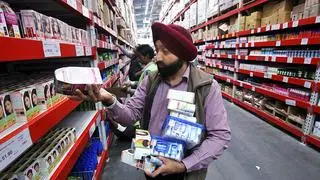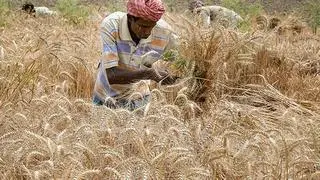On a day monsoon arrived in Kerala, industry body Assocham warned of a drought due to the >looming El Nino effect and a possible industrial slowdown.
In a paper on “El Nino, Drought and Growth Concerns of the Indian Economy”, The Associated Chambers of Commerce and Industry (Assocham) said on Friday that India had lost half of its economic growth momentum progressively within a two-year period after 2010-11. On the top of this, overall economic activity has witnessed further slump in 2013-14.
Blaming weak business confidence, high domestic inflation and revenue-centric fiscal expansionary stance adopted by the Government for pulling down economic growth, DS Rawat, Secretary-General, Assocham, said, but for the better performance of agriculture sector on the back of above average rainfall, the state of the economy would have been in a much worse condition.
Cause for worry
In this backdrop, reports about drought hitting the economy owing to the >El Nino factor , prima facie, is a matter of grave concern. Although the share of agriculture in GDP is only 14 per cent, about 52 per cent of the total workforce is still employed in the farm sector. A good harvest, in turn, giving a boost to agricultural income, results in increased demand for industrial products and increases demand for services like trade, transport, banking and insurance.
About 30 per cent of the manufacturing sector is agriculture-based. So a bumper crop ensures the supply of raw material for industry at relatively lower prices. Moreover, about 60 per cent of net sown area of the country is rain-fed. Thus, higher growth in agriculture production stimulates industry and thereby services sectors.
Rawat said that India faces drought prospects every fifth year, the last one being in 2009, indicating a possible drought in 2014 in areas potentially receiving less than 10 per cent rainfall. Typically, El Nino conditions lead to either delay in the arrival of monsoons or deficient rainfall in the beginning of kharif season (June-September). As a result, the production of summer crops such as oilseeds, cotton, rice and sugarcane may get affected. India has been heavily dependent on imports for vegetable oils and pulses.
High food prices
In 2013-14, India had imported vegetable oils and pulses worth $8.5 billion and $1.6 billion respectively in the first eleven months. In the corresponding period of 2012-13 fiscal, the combined value of these imports was $12.6 billion. Thus, one of the main implications of the country witnessing deficient rainfall is increased import bill of vegetable oils and pulses.
Expressing concern about possible high food prices, Rawat said it averaged 10 per cent during 2008-09 to December 2012. Average Indians still spend almost half of their income on food whereas a poor household spends still higher share on food.
However, he said, past experiences indicate that in 2000, 2005 and 2009, agriculture GDP rose despite rains being significantly below average. Also, all El Nino years have not resulted in a drought, although all droughts have happened in years of El Nino.
Needed, govt action
The 2009 experience indicated that in spite of having adequate foodgrain stocks, the country witnessed shooting up of >food inflation . The government did not intervene in the market effectively mainly basking in the glory of stocks of foodgrains. Higher inflationary expectations fed into higher prices and wage rates which finally affected corporate investments. Therefore, rise in food inflation has disastrous consequences on growth, he added.
Calling for an “effective government action” as a necessary condition for using the available food grains to intervene in the market and contain hoarding and speculative activity, he said agricultural exports on the back of bumper crops produced during the last fiscal may lead to “severe consequences”.
Rawat emphasised on >policy prudence , stressing the need for expanding the farm insurance cover and suggested the Government advice banks and financial institutions to settle crop insurance claims in the drought hit areas without delay. He also called for making good the shortfall of oilseeds and pulses and liquidation of the extra stock of foodgrains.







Comments
Comments have to be in English, and in full sentences. They cannot be abusive or personal. Please abide by our community guidelines for posting your comments.
We have migrated to a new commenting platform. If you are already a registered user of TheHindu Businessline and logged in, you may continue to engage with our articles. If you do not have an account please register and login to post comments. Users can access their older comments by logging into their accounts on Vuukle.